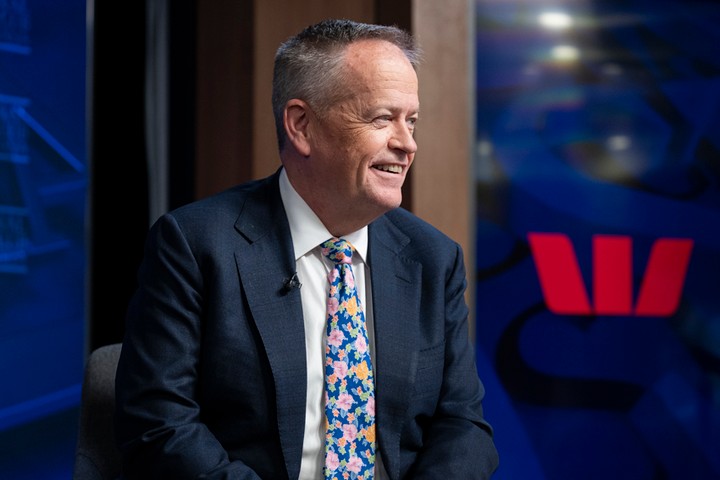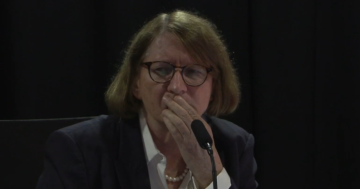
There is no escaping APS Commissioner Gordon de Brouwer now for those former agency heads involved in Robodebt. Photo: APSC.
It’s a sure sign the federal government is feeling the public outrage at the dearth of accountability over Robodebt that it is rushing new legislation through parliament in the hope of delivering a head or two.
Struggling in the polls with an election on the horizon, Labor needs something to remind voters that it’s “on their side” and that it’s championing the cause of the underdog.
That’s a tough gig and not everyone’s buying it.
A 15 per cent pay rise for early childhood educators is one way for the government to say “we’re here for you” and it is certainly going to town this week in parliament reminding everyone of just how “generous” it is being on that front.
There’s no greater soapbox than the shame of Robodebt, however, to reinforce in the minds of Australians that the Coalition was mean and ruthless when last in government.
The illegal automated debt recovery program that caused so much harm to so many people was indeed a product of the Coalition.
Since coming to office, Labor has dined out on that fact alone.
Anthony Albanese instigated the Royal Commission into the scheme, which was extremely thorough and delivered a massive report naming a sizeable number of players for alleged reprehensible conduct.
The problem for Labor, though, was that Royal Commissioner Catherine Holmes kept part of that report sealed – the part that referred people to the Australian Federal Police, to the Australian Public Service Commission, to the National Anti-Corruption Commission, and to the ACT Law Society.
It recommended civil and criminal prosecutions.
Government Services Minister Bill Shorten lamented to the National Press Club yesterday (13 August) that he’s not winning the battle to have the sealed section released publicly.

Bill Shorten is keeping up the fight to unseal sections of the Robodebt Royal Commission findings. Photo: Fernanda Pedroso (NPC).
The problem remains then, as far as the public is aware, that there hasn’t been much by way of prosecution.
The NACC decided not to investigate the six people the Royal Commission strongly recommended it should.
That decision immediately became the subject of an investigation itself after the NACC’s independent Inspector Gail Furness, responding to a public outcry, stepped in to enquire as to how the corruption watchdog came to the conclusion it did.
The AFP investigated allegations a witness provided false testimony to the Royal Commission but concluded there was not enough evidence to charge anyone.
The APSC has conducted investigations into current and former public servants over breaches of the APS Code of Conduct. A total of 16 current and former APS employees were referred to the commissioner for code of conduct scrutiny over the illegal scheme.
The Royal Commission only referred current APS employees to the commissioner for possible sanction, but the APSC itself also referred past serving public servants and former agency heads to its centralised code of conduct mechanism.
The former employees were included to ensure equitable treatment.
Former employees were referred by their most recent agency heads, while former agency heads included in the list were referred by Public Service Minister Katy Gallagher following advice from Department of Prime Minister and Cabinet secretary Glyn Davis.
Commissioner Gordon de Brouwer, in answering questions during recent Senate Estimates appearances, has talked of sanctions for some but also the innocence or too low thresholds for breaches of others.
No names have been released, but the commissioner is due to deliver a report into his investigations.
It’s a fair question for the public to be asking just where accountability is for the reprehensible behaviour of some people in power during Robodebt.
So today (14 August), the Federal Government is introducing an amendment to the Public Service Act to give the APS Commissioner an express power to investigate and make determinations against former agency heads.
It seems one or more former agency heads made a case to the commissioner that he didn’t have those powers under the Act as it stands and so could not legally investigate them.
Perhaps they thought they had found a loophole by which they could escape accountability for their own roles in Robodebt.
They probably did find a loophole. But the government has moved to close it.
The commissioner will soon have the express power to investigate these former agency heads.
He actually investigated them, but now his findings will be delivered under the security of tighter legal grounds.
That’s a good move.
The government needs a political bounce, and it hopes this decisive move might bring it.
The nation needs to see someone – many even – brought to account for what they did to the most vulnerable of Australians.




















